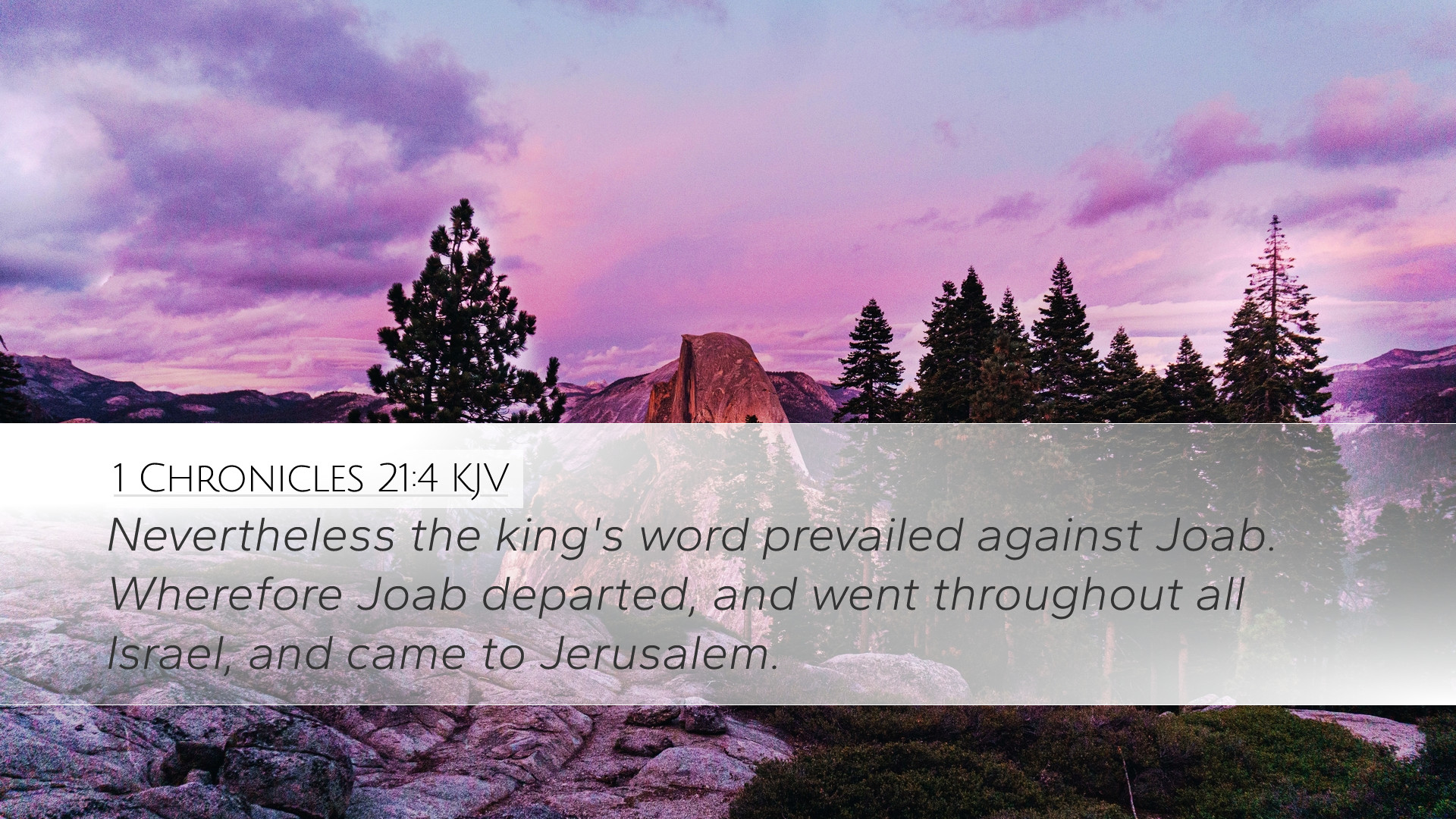Commentary on 1 Chronicles 21:4
Bible Verse: 1 Chronicles 21:4 - "Nevertheless, the king's word prevailed against Joab. Wherefore Joab departed, and went throughout all Israel, and came to Jerusalem."
Introduction
This verse captures a pivotal moment in the reign of King David and highlights the dynamics of authority, obedience, and the consequences of sin. In the broader context of 1 Chronicles 21, we explore David’s decision to conduct a census of Israel, which was contrary to God’s commandments and ultimately led to severe consequences for the nation.
Contextual Analysis
The narrative begins with an inquiry that is significant not only for its political implications but also for its theological ramifications. David's decision to take a census reveals his human inclination towards pride and self-sufficiency.
- Historical Setting: The chapter details the transition in David’s leadership, showcasing both his strengths and weaknesses.
- Joab's Reaction: Joab's hesitance and moral objections serve as a foil to David's commands, illustrating the tension between divine will and human leadership.
- Divine Displeasure: The actions taken by David, and the resulting outcomes, signal the importance of obedience to divine directives over human reasoning.
Interpretative Insights
The commentary on this verse derives important lessons that resonate deeply within pastoral, scholarly, and theological conversations.
Authority and Submission
Matthew Henry emphasizes the aspect of authority in leadership, noting how King David's word prevailed over Joab's legitimate concerns. This fact raises questions about the responsibilities of leaders:
- Leaders must heed counsel and weigh the advice of others against God's revelations.
- True leadership involves listening to warnings, especially when they emerge from a place of fidelity to God’s instructions.
The Role of Joab
Albert Barnes provides a thorough exploration of Joab’s character. He highlights Joab’s awareness of God's law and his discontent with David's command:
- Joab, despite being a military commander, demonstrates a heart aligned with God’s intentions.
- His departure indicates a reluctance to partake in an act he perceives as displeasing to the Lord.
- This illustrates the moral dilemmas faced by individuals within powerful institutions.
The Consequence of Sin
Adam Clarke elaborates on the aftermath of David’s sinful decision. The verse serves as a precursor to the calamities that follow:
- The importance of accountability in spiritual matters is accentuated; David's pride leads him down a path that invites divine judgment.
- Thus, the narratives surrounding this verse remind us of the severe consequences that follow our choices in defiance of God’s commandments.
Theological Implications
Across the interpretations, several theological themes emerge which are relevant for contemporary readers:
Human Fallibility
David’s actions reveal the inherent vulnerability of even the most devout leaders when they stray from reliance on God. It is a reminder of the need for constant vigilance against pride and self-reliance.
God’s Sovereignty
The outcome illustrates God’s sovereign authority over nations; despite human decisions, He remains the ultimate authority with power over the hearts and minds of kings.
Repentance and Redemption
The narrative is not merely one of failure but also of God’s willingness to extend grace to those who genuinely repent. King David's story offers a hopeful reminder that restoration is possible through humility and acknowledging one’s transgressions.
Conclusion
1 Chronicles 21:4 serves as a profound reflection on leadership, obedience, and the complexities of human nature in relation to divine authority. For pastors, theologians, and students, it provides rich ground for discussion on the implications of our choices and our need for divine guidance in all aspects of life.


